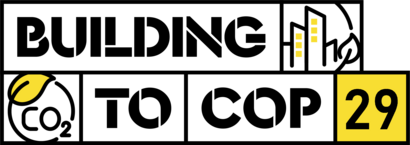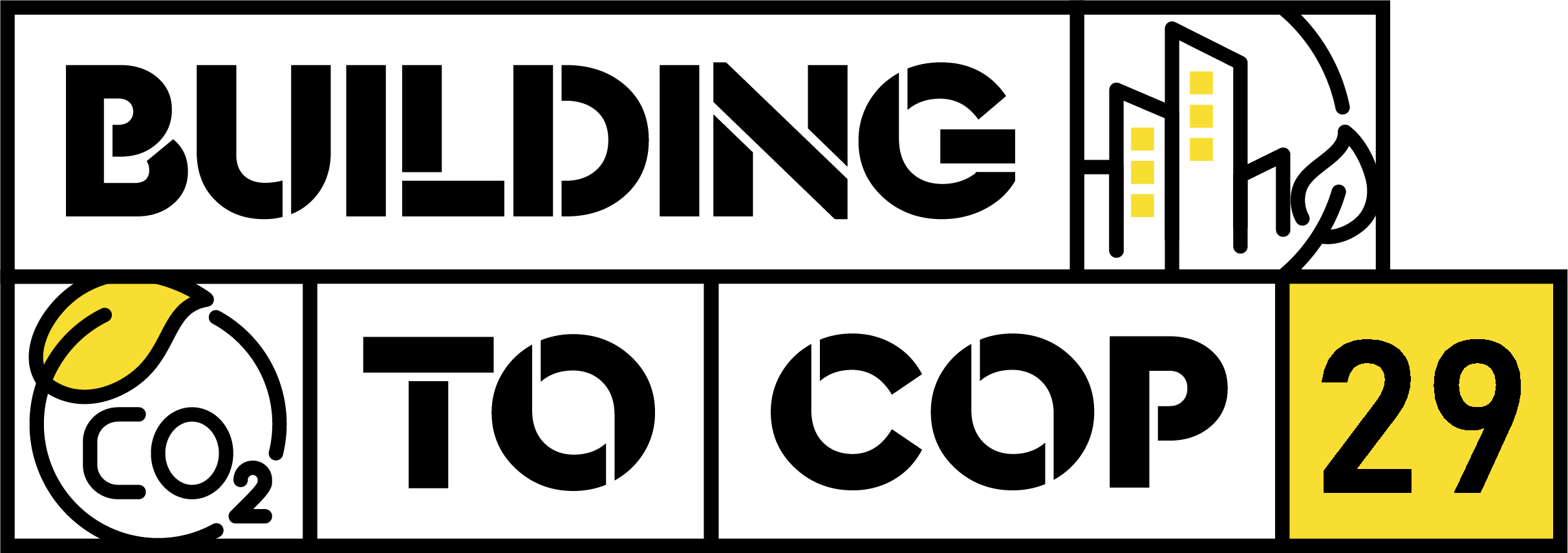Dear Parties to the COP
The built environment is responsible for almost 40% of energy related CO2 emissions, fuelling the rising temperatures that are rendering much of where we live, work, sleep, play, heal and relax uninhabitable. As we write this, one in seven people live in homes that are not climate resilient or safe.
COP27 saw Parties come together in support of the Sharm-El-Sheikh Adaptation Agenda, one of its goals being to ensure 1 billion people have better design, construction, and access to finance to live in decent, safe homes by 2030. …Read More
We are #BuildingToCOP29
The built environment – buildings, infrastructure and cities – impacts everyone, and everywhere. Its potential to support decarbonisation efforts and benefit citizens, wherever they are in the world, must not be underestimated.
The BuildingToCOP coalition brings together leaders from across the sector who are promoting the built environment’s potential in accelerating the transition to a healthy, safe and resilient net zero future.
Instrumental in establishing a dedicated day for the built environment at the upcoming COP28 summit, BuildingToCOP’s members are united by a single mission – to ensure the built environment is at the forefront of international climate dialogues and secure its recognitionin global decision making as an affordable, achievable, and essential solution.
It will be impossible to achieve our sustainability goals unless the vast potential of the built environment is unlocked.
We have the blueprints of how cities and buildings globally can adapt and mitigate against climate change. Now is the time for new policy and increased provision of capital which can accelerate the pace and scale of sustainable, equitable progress.
Why the built environment matters
- Buildings are responsible for almost 40% of global energy-related carbon emissions and 50% of all extracted materials.
- The building and construction sector’s demand on natural resources accelerates climate change, and inefficient, unhealthy buildings negatively impact human health and wellbeing.
- To meet climate goals, cities must reduce their carbon footprint by 45%
Climate solutions exist within our buildings, cities and infrastructure. From energy-efficient designs to solar-integrated rooftops to green urban spaces and rainwater harvesting, the built environment is a living blueprint of climate solutions.
We are not starting from square one. Across the world, steps are already underway towards sustainable infrastructure and buildings. The expertise, knowledge, and techniques are all there.
By 2030
- Efficient buildings will be an investment opportunity worth $24.7 trillion across all emerging market cities. Most of this investment potential – $17.8 trillion – lies in East Asia Pacific and South Asia.
- Despite this, under $3 of every $100 spent on new construction goes to efficient buildings.
- Out of the 196 countries that have submitted Nationally Determined Contributions (NDCs) to the United Nations Framework Convention on Climate Change (UNFCCC), 158 countries mention buildings.
- In 2021, 79 countries had building energy codes which are either mandatory for at least part of the building stock or have a voluntary component. Yet, only 26% of countries had mandatory codes for the entire buildings sector.
By 2050
- 1.6 billion urban dwellers will be regularly exposed to extreme high temperatures.
- Over 800 million people living in more than 570 cities will be vulnerable to sea level rise and coastal flooding.
- By 2060 the world’s building stock will double and almost 70% of the global population is projected to live in urban areas.
- By 2050, cities will account for 70 percent of all carbon emissions and will need to reduce their carbon footprint by 45% to meet climate goals.
HOW WE HALVE EMISSIONS BY 2030
Businesses and sub-national governments are urged to join the Race to Zero.
All countries include full building decarbonisation targets, concrete policies and measures and related implementation mechanisms in their NDCs.
1,000 cities and at least 20% of the largest built environment businesses by revenue committed to the UN’s Race to Zero.
The sector’s stakeholders unite behind a single voice and ambition towards shared goals: By 2030, 100% of new buildings must be net-zero carbon in operation and embodied carbon must be reduced by at least 40%, and by 2050, all new and existing assets must be net zero across the whole life cycle (see UNFCCC Human Settlements Pathway).
RACE TO ZERO
and
RACE TO RESILIENCE
- Businesses and sub-national governments are urged to join the Race to Zero.
- Cities are urged to join the Cities Race to Zero, as major policy enablers and owners of real estate who can go further, faster.
- The Race to Resilience is catalysing a step-change in global ambition for climate resilience, putting people and nature first in pursuit of a resilient world.
We need to run these races together, at the same time — and win them ALL.
The Buildings Breakthrough
The Buildings Breakthrough target – “near-zero emission and resilient buildings are the new normal by 2030” – is co-led by France and the Kingdom of Morocco under the umbrella of the Global Alliance for Buildings and Construction (GlobalABC).
As of November 2023, 25 countries and 17 initiatives are supporting the Buildings Breakthrough. If your country or initiative is engaged in global sustainable buildings, and ready to support the Buildings Breakthrough target, get in touch with the GlobalABC Secretariat at global.abc@un.org.
Join the next #BuildingToCOP29 Forum
Following the BuildingToCOP Coalition’s successes at COP26, COP27 & COP28, we are #BuildingToCOP29.
Convening a powerful coalition of stakeholders, these Forums elevate the built environment as a critical climate solution ahead of COP29.

Support for BuildingToCOP29
Her Excellency Ms. Razan Al Mubarak
UN High-Level Climate Action Champion of the UAE at COP28
“As a lifelong champion of environmental action the opportunity to work on this global challenge is an honour”
Her Excellency Ms. Razan Al Mubarak has been announced as the UN Climate Change High-Level Champion from the COP28 Presidency. She will be joining Dr. Mahmoud Mohieldin who continues in his role as the UN Climate Change High-Level Champion from the COP27 Presidency.
HE Ms. Razan Al Mubarak is currently President of the International Union for Conservation of Nature (IUCN), the second woman to lead the organization in its 75-year history. She is also the founding director of the Mohamed bin Zayed Species Conservation Fund which, since its inception, has supported more than 2,500 species conservation projects in over 160 countries.
Dr. Mahmoud Mohieldin
UN High-Level Climate Action Champion of Egypt at COP27
Regardless of where you live or where you do business, we all need to build resilience to climate change.
The built environment sector has the opportunity to lead the resilience agenda, placing adaptation on par with mitigation through how we design, manage and occupy buildings and infrastructure for the worlds’ people. Regardless of where you live or where you do business, we all need to build resilience to climate change.
Coalition Members











In partnership with the Climate Champions Team

Powered by






